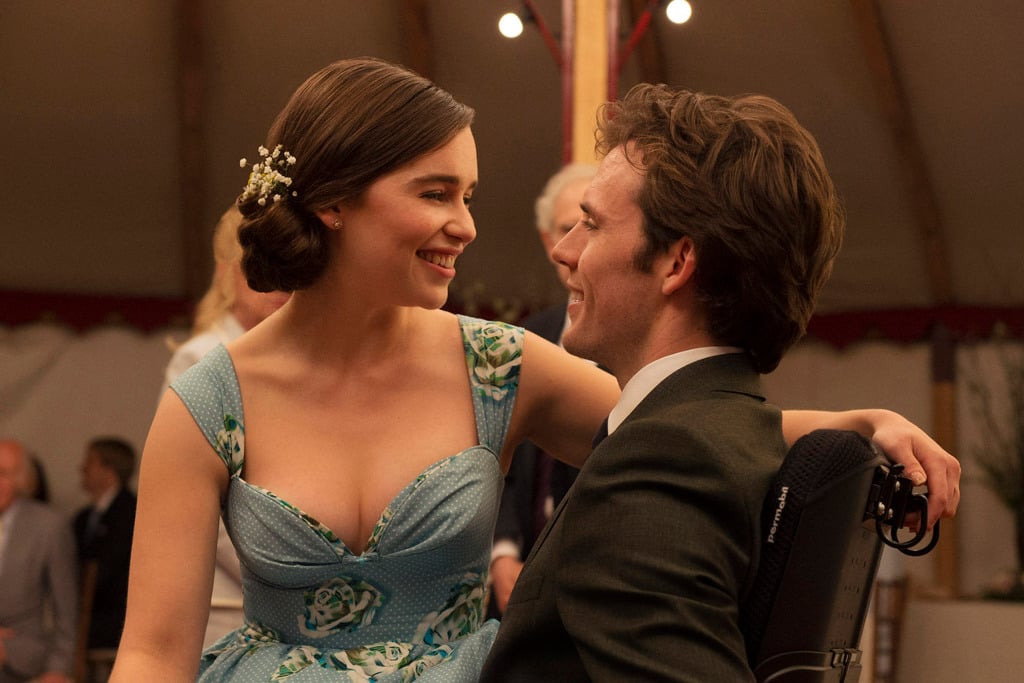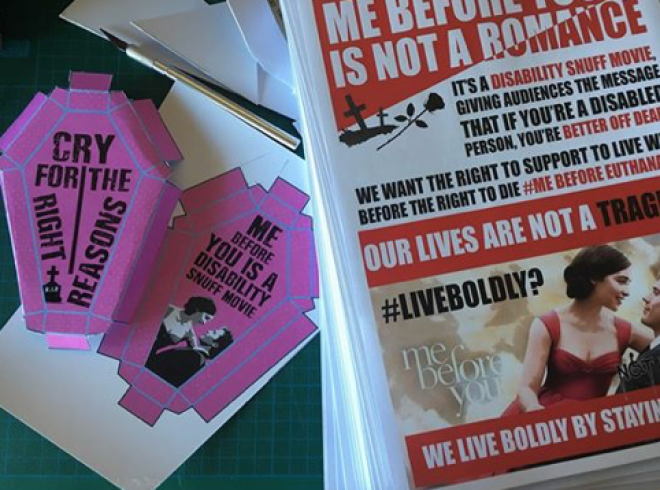Why I’m Boycotting ‘Me Before You’ And Why You Should Too
"Our lives are worth living and I want the world to know this."

This post includes spoilers for the film Me Before You. It also discusses depression and self-harm.
–
On the eve of the Australian release of Me Before You, the final touches are being applied to t-shirts, banners and coffin-shaped tissue boxes by many people with disabilities across Australia. The film, which has been courting controversy in the US and the UK, is set to be subject to protests here too. I am preparing to wear my t-shirt proudly to the Melbourne protest with its slogan “Disabled lives are worth living!”, as I hand out flyers proclaiming “our lives are not a tragedy!”

So why has a film which is being marketed as a quirky romance attracted such a backlash from people with disabilities?
–
“We Are Being Told That It’s Romantic And Noble To Die”
Me Before You is an adaptation of Jojo Moyes’ best-selling novel of the same name (which I have read), and stars Sam Claflin as Will Traynor: a handsome, wealthy young man who becomes a quadriplegic and Emilia Clarke as Louisa Clark — Will’s support worker who becomes his love interest. Sounds romantic and interesting? Disability advocates say perhaps it could have been if disability had been depicted in less harmful and stereotypical ways. The film began attracting criticism from disability advocates in February when the trailer raised concerns that the movie would portray disability as a terrible tragedy.
Before going any further I should declare two things: I am a wheelchair user and I am part of a group calling ourselves #CripArmy which are coordinating the protests against the film in Australia. Also, in order to discuss the main criticism that has been levelled at the film and why protests are being planned here I have to reveal its ending. Spoiler alert.
Louisa is hired as Will’s support worker after he has attempted suicide; she is essentially on suicide watch, however, troublingly, she isn’t informed of this fact. Will plans to travel to the (real-life) assisted dying organisation Dignitas in Switzerland in six months time, which he ultimately does, to end his life.
Let’s be clear here: Will ends his life solely on the basis of having disability. He cannot accept that he is now a wheelchair user and, although she protests otherwise, he believes Lou is better off without him. Will’s death is depicted as understandable and altruistic as he leaves all his money to Lou so she can pursue her dreams ‘unburdened’ as he sees it, by him and his disability.
As a wheelchair user, I am deeply concerned that this film perpetuates these messages: that the lives of people with disabilities are not worth living, and that people with disabilities cannot be worthy partners. It places people who have newly acquired disabilities, or young people with congenital disabilities who may be experiencing depression and grief as a result of this at further at risk of self-harm or suicide.
As a young person, I have at times struggled with depression and thoughts of suicide, so I know how damaging and harmful the film’s message — essentially that ‘you are better off dead than disabled’ — really can be. Many disability advocates in the US have also felt this, and in response they have released a disability suicide prevention video.
When able-bodied people feel as though they want to die, we get them help and talk about suicide prevention, but when people with disabilities are depressed, there’s a large subset of society sending the message that it’s understandable and wanting to legislate to help them do it.
As disability advocate Samantha Conner says: “People don’t understand why the movie is a problem but we are constantly told that death is preferable to being disabled, and they imagine that our lives are so narrow that we can’t possibly live well, live boldly. This movie reinforces those narratives [and] stereotypes. Why, at a time when suicide prevention messages are stronger than ever, are we being told that it’s romantic and noble to die?”
–
The Debate Around Euthanasia
This film also comes at a time when an assisted dying bill is expected to be tabled in Victorian parliament giving the issue raised in this film particular relevance to Australians, and in particular those living with disabilities. Currently, the bill would only apply to those with a terminal illness. Nonetheless, many are wary of the regulations around this term and feel that, if passed, the bill would disproportionally affect people with disabilities. Many disabilities effectively shorten the lifespan.
Those within the disability community campaigning directly against euthanasia are doing so because they believe we first need the right supports to be able to live our lives fully and equally before the right to die. The argument is that, until society has the capacity to provide all the services which would enable people with disabilities to participate fully and equally in society, then a choice for assisted dying is never truly voluntary. They warn of the dangers of legal assisted dying existing in a society which devalues the lives of disabled people and tells us that we are better off dead, that our partners would be better off if we didn’t exist, that our parents would be better off if we had never been born, that we are a burden on resources and society.
“When my husband sustained a spinal cord injury (the same disability type as Will) people made comments and judgments about the value of his life and assumed that in the blink of an eye he was suddenly worth less,” says Kelly Cox, a disability advocate and wheelchair user. “Movies like this contribute to those judgments. When people assumed his life wasn’t worth living anymore or suggested I just leave him, it is because they have been sold a lie about disability. This movie is another lie and will cause more judgment and more hurt.”
–
#LiveBoldly Is Bullshit
It is without a touch of irony that the marketing team behind Me Before You decided to choose the hashtag #LiveBoldly for a film in which the lead character ends his life. And, when Sam Clafin hosted a Twitter Q&A about the film last month, this is an issue which disability activists raised directly with him:
Did you consider how damaging the storyline was to disabled people who want to #LiveBoldly and not be killed off?
#AskSam @mebeforeyou— Jo Verrent (@joverrent) May 23, 2016
If a wealthy white disabled man can't #LiveBoldly, what message does that send to disabled people living in poverty? #AskSam
— Allen Mankewich (@AllenMankewich) May 23, 2016
The feed became so dominated by these challenging questions about the film’s representation of disability that the star ended the chat earlier than scheduled. But he probably shouldn’t have been surprised. The trope of ‘better off dead than disabled’ is far from new or inventive and it’s raised similar discussions in the past. The 2004 film Million Dollar Baby, based on a novel by FX Toole, depicts a similar plotline: the main character played by Hilary Swank becomes a quadriplegic and chooses to end her life. Despite widespread protests of the film, it grossed over $216 million internationally.
Writer, theatre performer, singer and disability activist, Jess Kapuscinski-Evans has the same level of spinal cord injury as Will. “The tragic figure of Will in Me Before You is divisive and harmful,” she says. “People like me are not better off dead. We are not ‘burdens’ whose best option is to commit suicide. People with disabilities need more supports and opportunities and to feel that our lives are worth living. We need to see films that show a diversity of stories by and about people with disabilities. This film does not do that. Our lives are worth living and I want the world to know this!”
Let’s kill this film, not the disabled guy in it.
–
There are protests scheduled this week against Me Before You in Melbourne and Perth. You can create your own in your town or city by printing out this flyer or banner. We are calling for a boycott of the film with the hope that if enough people join us and don’t go see it, that cinemas will stop showing it. Let’s lead the way on this and show the film industry that we are over seeing disability stereotypes. Save your money and support disability-led art.
–
If you feel the need to talk to someone after reading this piece you can contact Lifeline 24 hours a day on 13 11 14 or QLife 3pm-12am on 1800 184 527.
–
Jax Jacki Brown is a disability and queer rights activist, public speaker, writer, spoken-word performer, and co-producer of Quippings Disability Unleashed, a disability performance troupe in Melbourne. She tweets at @jaxjackibrown.